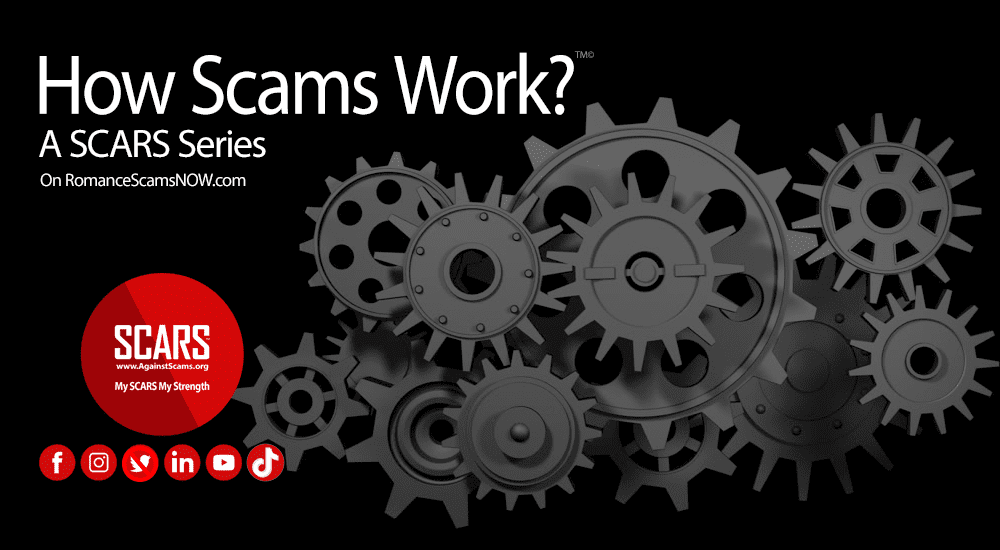
SCARS Institute’s Encyclopedia of Scams™ Published Continuously for 25 Years

BEC Scams – Don’t Pay For Anything With A Gift Card
How Scams Work! Business Email & Phone Gift Card Scams
A SCARS Insight
Look, Your Boss Isn’t Emailing You About A Gift Card
It’s A Scam
- Did you get an email from your boss asking you for a favor?
- Does your boss need you to send gift cards to pay for an upcoming office party?
Before you go out and pay up, ask yourself: is that really your boss? It could be a scammer trying to get your money.
Here’s how these scams work:
- The scammer sends you an email impersonating your boss, either using a spoofed email address or by hacking into their account.
- They then make up a story about needing your help with something — an office surprise party, a company event, even a simple errand.
- Whatever the reason, they’ll ask you to help by paying them with gift cards, promising to pay you back later.
- But once you hand over the gift card number and PIN, the money is gone.
If you get an unexpected email from your boss asking for this kind of help:
- Don’t pay for anything with a gift card. Gift cards are for gifts, not for payments. If anyone asks you to pay with a gift card, it’s a scam.
- Double-check with your supervisor. Call your boss using a known number — not something that was written in the email.
- Take a pause. Can’t reach your manager? Talk to a trusted coworker or friend. Tell them the situation and see what they would do.
Test scams can also come through as a voice message or a text!
Gift Card Scams
Someone might ask you to pay for something by putting money on a gift card, like a Google Play or iTunes card, and then giving them the numbers on the back of the card.
If they ask you to do this, they’re trying to scam you. No real business or government agency will ever insist you pay them with a gift card. Anyone who demands to be paid with a gift card is a scammer. Read on to learn more about gift card scams.
All Gift Card Scams Have Things In Common!
Gift cards are for gifts, not for payments. But they’re popular with scammers because they’re easy for people to find and buy, and they have fewer protections for buyers compared to some other payment options. They are more like cash: once you use the card, the money on it is gone. Scammers like this.
- If someone emails, texts, or calls and asks or demands that you pay them with gift cards, you can bet that a scammer is behind that call.
- Once they have the gift card number and the PIN, they have your money.
- Scammers may tell you many stories to get you to pay them with gift cards, but this is what usually happens:
The caller says it’s urgent. The scammer says you have to pay right away or something terrible will happen. But you don’t, and it won’t.
The caller usually tells you which gift card to buy. They might say to put money on an eBay, Google Play, Target, or iTunes gift card.
They might send you to a specific store — often Walmart, Target, CVS, or Walgreens. Sometimes they say to buy cards at several stores, so cashiers won’t get suspicious. And, the caller might stay on the phone with you while you go to the store and load money onto the card.
These are all signs of a scam.
The caller asks you for the gift card number and PIN. The card number and PIN on the back of the card let the scammer get the money you loaded onto the card. And the scammer gets it right away.
That’s it, the money is gone and you are left with the loss!
Did You Or Someone You Know Pay A Scammer?
Find out what to do next. If you act quickly, sometimes (only sometimes) you can get your money back. But it’s worth trying.
And if you spotted this scam, report it at ReportFraud.ftc.gov and one www.Anyscam.com
-/ 30 /-
What do you think about this?
Please share your thoughts in a comment below!
LEAVE A COMMENT?
Recent Comments
On Other Articles
- Arwyn Lautenschlager on Love Bombing And How Romance Scam Victims Are Forced To Feel: “I was love bombed to the point that I would do just about anything for the scammer(s). I was told…” Feb 11, 14:24
- on Dani Daniels (Kira Lee Orsag): Another Scammer’s Favorite: “You provide a valuable service! I wish more people knew about it!” Feb 10, 15:05
- on Danielle Delaunay/Danielle Genevieve – Stolen Identity/Stolen Photos – Impersonation Victim UPDATED 2024: “We highly recommend that you simply turn away form the scam and scammers, and focus on the development of a…” Feb 4, 19:47
- on The Art Of Deception: The Fundamental Principals Of Successful Deceptions – 2024: “I experienced many of the deceptive tactics that romance scammers use. I was told various stories of hardship and why…” Feb 4, 15:27
- on Danielle Delaunay/Danielle Genevieve – Stolen Identity/Stolen Photos – Impersonation Victim UPDATED 2024: “Yes, I’m in that exact situation also. “Danielle” has seriously scammed me for 3 years now. “She” (he) doesn’t know…” Feb 4, 14:58
- on An Essay on Justice and Money Recovery – 2026: “you are so right I accidentally clicked on online justice I signed an agreement for 12k upfront but cd only…” Feb 3, 08:16
- on The SCARS Institute Top 50 Celebrity Impersonation Scams – 2025: “Quora has had visits from scammers pretending to be Keanu Reeves and Paul McCartney in 2025 and 2026.” Jan 27, 17:45
- on Scam Victims Should Limit Their Exposure To Scam News & Scammer Photos: “I used to look at scammers photos all the time; however, I don’t feel the need to do it anymore.…” Jan 26, 23:19
- on After A Scam, No One Can Tell You How You Will React: “This article was very informative, my scams happened 5 years ago; however, l do remember several of those emotions and/or…” Jan 23, 17:17
- on Situational Awareness and How Trauma Makes Scam Victims Less Safe – 2024: “I need to be more observant and I am practicing situational awareness. I’m saving this article to remind me of…” Jan 21, 22:55
ARTICLE META
Important Information for New Scam Victims
- Please visit www.ScamVictimsSupport.org – a SCARS Website for New Scam Victims & Sextortion Victims
- Enroll in FREE SCARS Scam Survivor’s School now at www.SCARSeducation.org
- Please visit www.ScamPsychology.org – to more fully understand the psychological concepts involved in scams and scam victim recovery
If you are looking for local trauma counselors please visit counseling.AgainstScams.org or join SCARS for our counseling/therapy benefit: membership.AgainstScams.org
If you need to speak with someone now, you can dial 988 or find phone numbers for crisis hotlines all around the world here: www.opencounseling.com/suicide-hotlines
A Note About Labeling!
We often use the term ‘scam victim’ in our articles, but this is a convenience to help those searching for information in search engines like Google. It is just a convenience and has no deeper meaning. If you have come through such an experience, YOU are a Survivor! It was not your fault. You are not alone! Axios!
A Question of Trust
At the SCARS Institute, we invite you to do your own research on the topics we speak about and publish, Our team investigates the subject being discussed, especially when it comes to understanding the scam victims-survivors experience. You can do Google searches but in many cases, you will have to wade through scientific papers and studies. However, remember that biases and perspectives matter and influence the outcome. Regardless, we encourage you to explore these topics as thoroughly as you can for your own awareness.
Statement About Victim Blaming
SCARS Institute articles examine different aspects of the scam victim experience, as well as those who may have been secondary victims. This work focuses on understanding victimization through the science of victimology, including common psychological and behavioral responses. The purpose is to help victims and survivors understand why these crimes occurred, reduce shame and self-blame, strengthen recovery programs and victim opportunities, and lower the risk of future victimization.
At times, these discussions may sound uncomfortable, overwhelming, or may be mistaken for blame. They are not. Scam victims are never blamed. Our goal is to explain the mechanisms of deception and the human responses that scammers exploit, and the processes that occur after the scam ends, so victims can better understand what happened to them and why it felt convincing at the time, and what the path looks like going forward.
Articles that address the psychology, neurology, physiology, and other characteristics of scams and the victim experience recognize that all people share cognitive and emotional traits that can be manipulated under the right conditions. These characteristics are not flaws. They are normal human functions that criminals deliberately exploit. Victims typically have little awareness of these mechanisms while a scam is unfolding and a very limited ability to control them. Awareness often comes only after the harm has occurred.
By explaining these processes, these articles help victims make sense of their experiences, understand common post-scam reactions, and identify ways to protect themselves moving forward. This knowledge supports recovery by replacing confusion and self-blame with clarity, context, and self-compassion.
Additional educational material on these topics is available at ScamPsychology.org – ScamsNOW.com and other SCARS Institute websites.
Psychology Disclaimer:
All articles about psychology and the human brain on this website are for information & education only
The information provided in this article is intended for educational and self-help purposes only and should not be construed as a substitute for professional therapy or counseling.
While any self-help techniques outlined herein may be beneficial for scam victims seeking to recover from their experience and move towards recovery, it is important to consult with a qualified mental health professional before initiating any course of action. Each individual’s experience and needs are unique, and what works for one person may not be suitable for another.
Additionally, any approach may not be appropriate for individuals with certain pre-existing mental health conditions or trauma histories. It is advisable to seek guidance from a licensed therapist or counselor who can provide personalized support, guidance, and treatment tailored to your specific needs.
If you are experiencing significant distress or emotional difficulties related to a scam or other traumatic event, please consult your doctor or mental health provider for appropriate care and support.
Also read our SCARS Institute Statement about Professional Care for Scam Victims – click here to go to our ScamsNOW.com website.
















Thank you for your comment. You may receive an email to follow up. We never share your data with marketers.